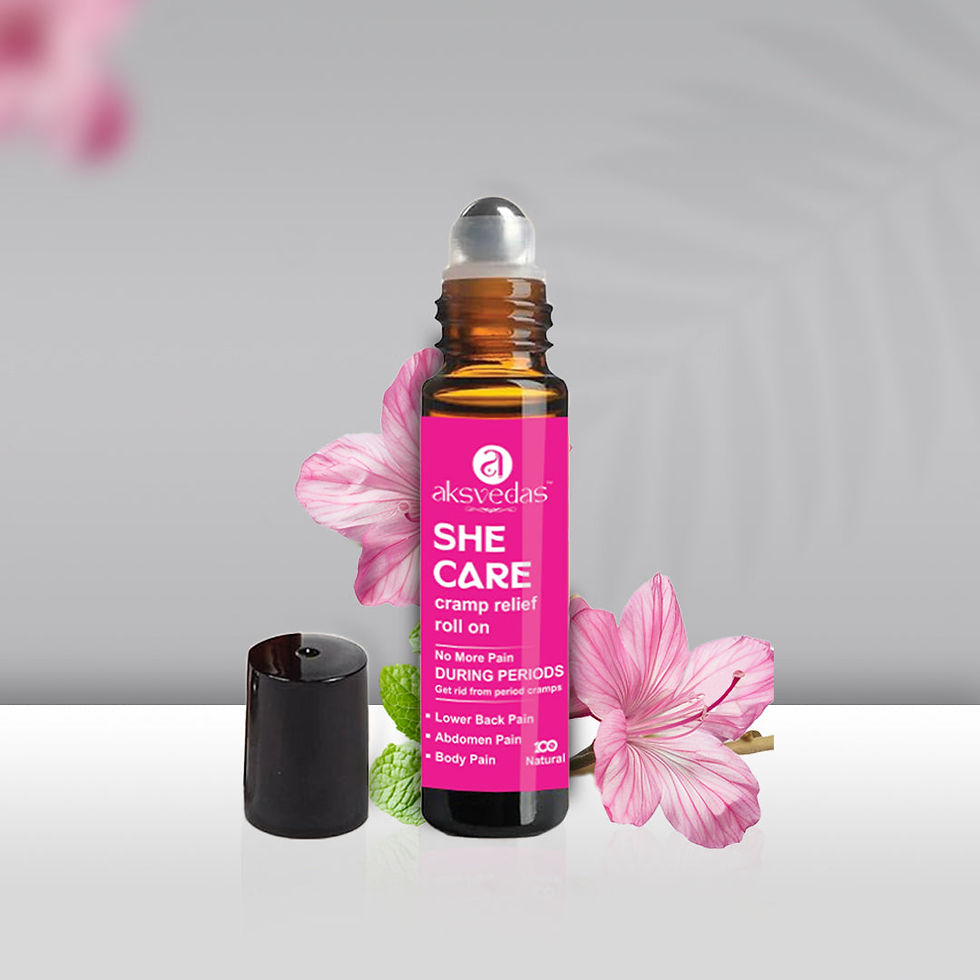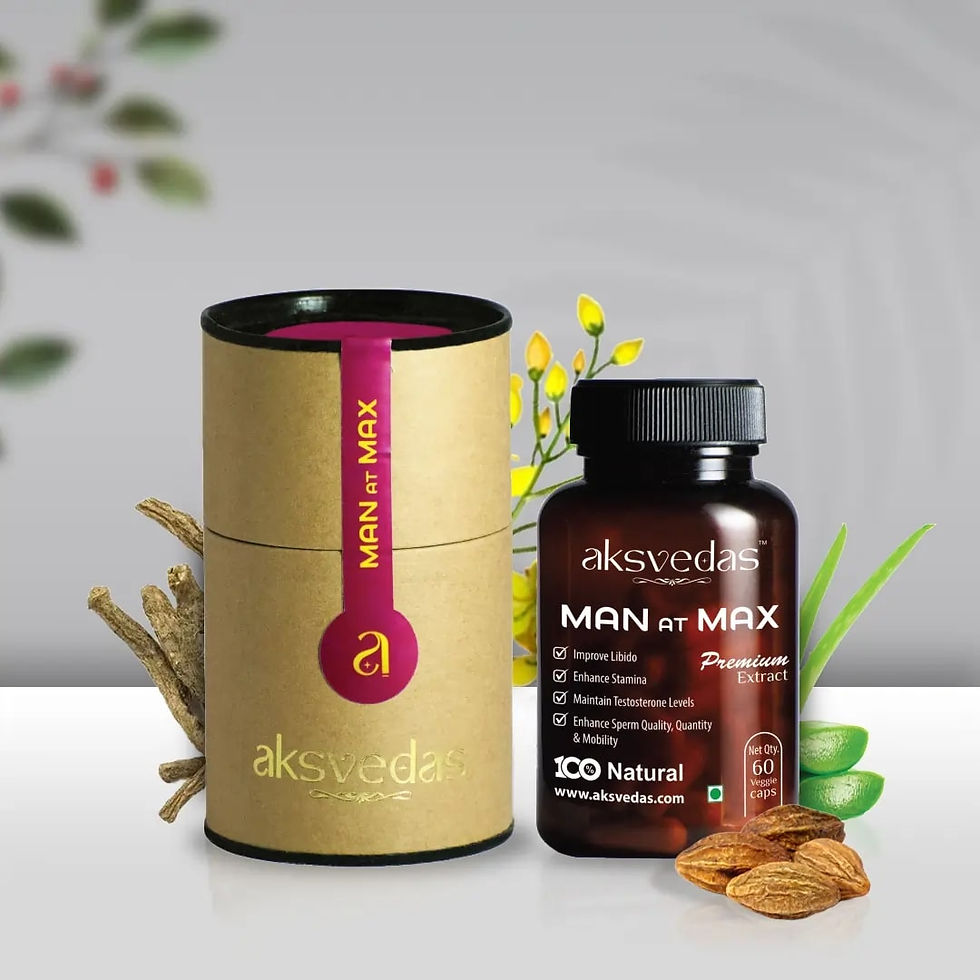How Stress Affects Testosterone (And How to Fix It)
- Aksvedas Store
- Jul 23
- 3 min read
In today’s fast-paced world, stress has become a constant companion for many men. From juggling demanding work schedules to managing finances, family responsibilities, and personal goals, it’s easy to feel overwhelmed. What many don’t realize, however, is the silent toll stress takes on their hormonal health—especially testosterone levels. In this blog, we’ll explore the science behind how stress affects testosterone and discuss effective, natural ways to restore hormonal balance—including the role of the best testosterone booster in India.

Understanding Testosterone and Its Importance
Testosterone is a vital male hormone produced mainly in the testicles. It plays a critical role in:
Maintaining energy and stamina
Supporting muscle mass and bone density
Enhancing mood and cognitive function
Regulating libido and reproductive health
Naturally, testosterone levels begin to decline gradually after the age of 30. But when chronic stress enters the picture, this decline can accelerate—leading to fatigue, low drive, muscle loss, and even depression.
The Stress-Testosterone Connection
The body’s response to stress is controlled by the hypothalamic-pituitary-adrenal (HPA) axis, which regulates the production of cortisol—the primary stress hormone. In the short term, cortisol helps you deal with threats or pressure by increasing alertness and energy. However, long-term (chronic) stress leads to elevated cortisol levels, which suppress testosterone production in several ways:
Cortisol Inhibits Testosterone Synthesis: Cortisol and testosterone share a biochemical pathway. When cortisol levels rise, they compete for the same precursors, reducing the resources available for testosterone synthesis.
Disrupted Sleep: Stress interferes with sleep, and poor sleep is directly linked to reduced testosterone production. Most testosterone is produced during deep sleep, particularly REM cycles.
Increased Fatigue and Inflammation: Chronic stress increases systemic inflammation and fatigue, both of which negatively impact testosterone levels and overall well-being.
Lowered Libido and Performance: High cortisol levels can also diminish sex drive, motivation, and physical performance—creating a vicious cycle of low energy and frustration.
Symptoms of Low Testosterone Due to Stress
If stress is suppressing your testosterone, you may experience:
Constant fatigue, despite adequate rest
Reduced interest in intimacy
Decreased muscle strength
Difficulty concentrating or staying motivated
Mood swings, anxiety, or low self-esteem
Slower recovery from workouts
Increased abdominal fat
If these signs sound familiar, it’s time to take action.
Natural Ways to Lower Stress and Boost Testosterone
Thankfully, you don’t need synthetic hormones or drastic medical interventions to regain balance. The key lies in managing stress while naturally supporting your body’s testosterone production. Here’s how:
1. Prioritize Quality Sleep
Aim for 7–9 hours of uninterrupted, deep sleep each night. Try these tips:
Maintain a consistent sleep schedule
Avoid screens at least 30 minutes before bed
Keep your room dark and cool
Avoid caffeine late in the day
2. Practice Mindfulness and Stress Management
Incorporate relaxation techniques into your daily routine:
Meditation: Reduces cortisol and improves mental clarity
Deep Breathing: Calms the nervous system and lowers stress levels
Exercise: Strength training and moderate cardio help reduce stress and stimulate testosterone
3. Eat a Testosterone-Friendly Diet
Nutrition is key. Focus on:
Healthy fats (avocados, nuts, olive oil)
Zinc-rich foods (pumpkin seeds, lentils, chickpeas)
Lean protein (chicken, eggs, tofu)
Cruciferous vegetables (broccoli, cauliflower)
Avoid processed sugars, excess alcohol, and high-sodium foods which can elevate cortisol.
4. Use Natural Supplements
Ayurvedic and plant-based supplements can play a powerful role in naturally boosting testosterone and reducing stress.
Aksvedas Testo At Max, one of the best testosterone boosters in India, contains potent ingredients like Ashwagandha, Fenugreek, and Gokshura. Here’s how it helps:
Ashwagandha: Reduces cortisol levels, balances hormones, and improves energy
Fenugreek: Enhances testosterone levels and stamina
Gokshura and Shatavari: Support reproductive health and overall vitality
These herbs work synergistically to restore hormonal harmony, improve mood, and revitalize energy levels—without any synthetic additives or side effects.
5. Stay Active
Regular physical activity, particularly resistance training, has a positive impact on testosterone. Exercise also acts as a natural stress reliever. Aim for at least 3–4 strength workouts per week.
Conclusion: Take Back Control of Your Hormonal Health
Stress might be inevitable, but its effects on your testosterone levels are not. By understanding the link between stress and hormone imbalance, you can take proactive steps to feel more energized, focused, and confident. From better sleep and mindful practices to smart nutrition and herbal support, every lifestyle improvement helps you reclaim your inner vitality.
If you're looking for a reliable, Ayurvedic way to support your energy, stamina, and hormone balance, Aksvedas Testo At Max is a top contender for the best testosterone booster in India—crafted for men who want real, long-term results without compromising their health.



Comments